Truth About Allegations Against Cauvery Calling by Pseudo Environmentalists
This is a response to an open letter written to actor Leonardo DiCaprio by certain self-proclaimed environmental groups, that is devoid of evidence, study and concern for 84 million people living in Cauvery river basin. In order to expose the malicious intention behind these baseless allegations, we present the following evidence for education of all.
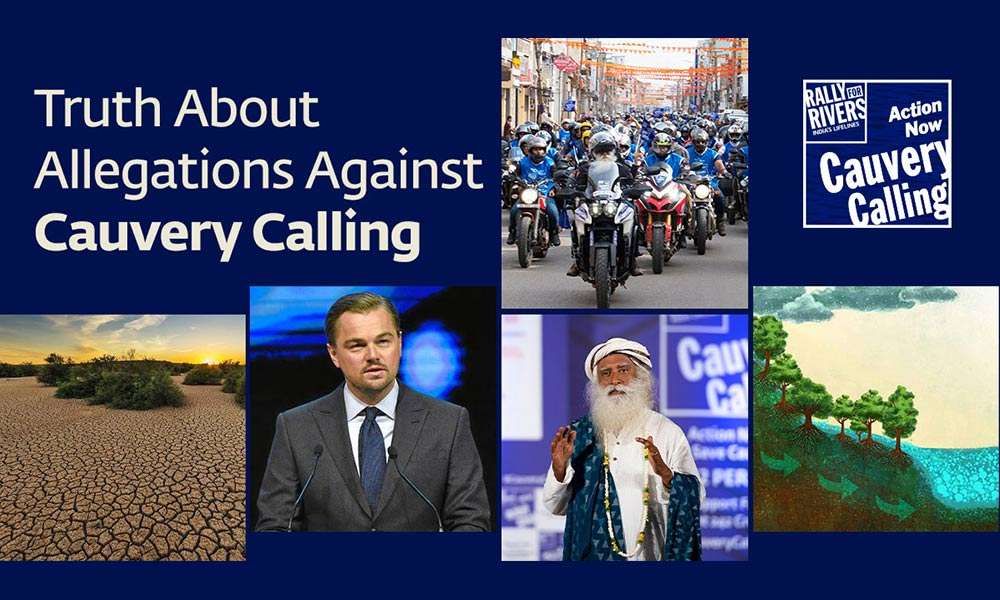
An open letter recently written to actor Leonardo DiCaprio attempts to gain publicity by attacking a high visibility cause supported by a prominent celebrity. Unfortunately, a few media outlets are picking up the article without doing their due diligence or asking for comments from the other parties involved in the story. The letter is a baseless opinion that contains blatant untruths and loose comments with no backing in facts.
The main argument is that the Cauvery Calling movement is proposing simplistic solutions, such as planting monocultures of trees on riverbanks. That is factually incorrect: The Cauvery Calling campaign is a comprehensive plan to plant trees on a portion of private farm land in Cauvery basin districts.
The fundamental principles of Cauvery Calling have been supported by both Karnataka and Tamil Nadu governments.
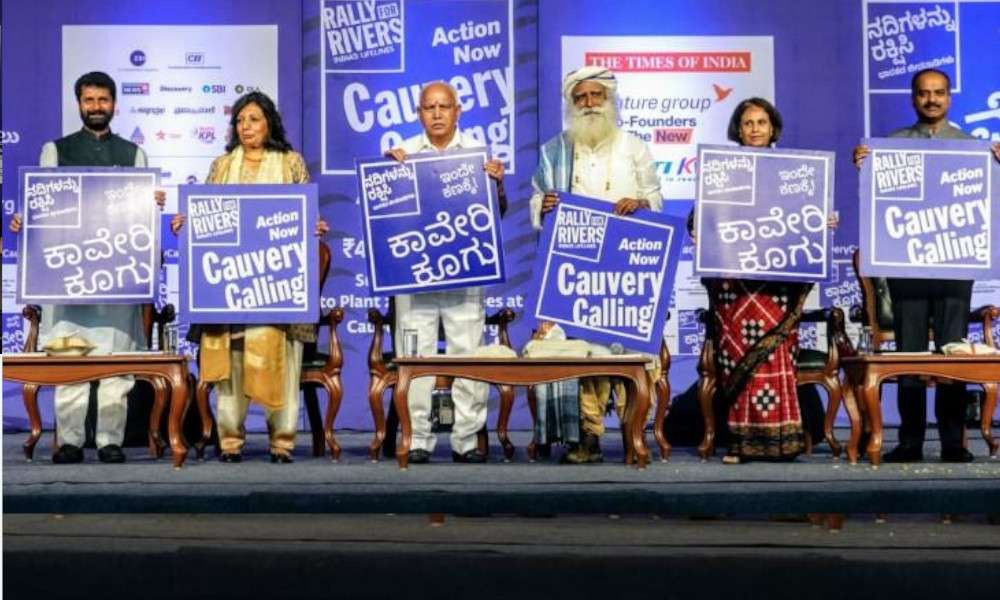
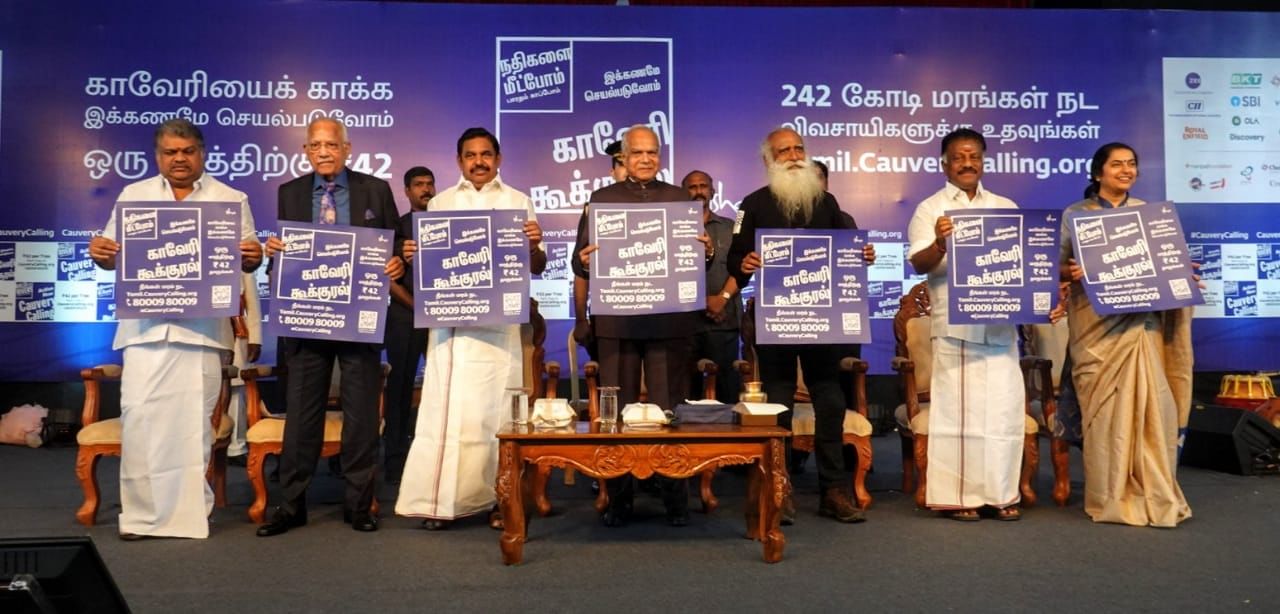
To incubate inspiration for agroforestry among the Karnataka farmers it's been agreed with the state govt to involve 500 farmers in each of the 54 taluks as the first step towards fulfilling the goals of #CauveryCalling. -Sg (1/2)@BSYBJP @PrakashJavdekar @moefcc @CMOTamilNadu pic.twitter.com/pbpzoAUtpk
— Sadhguru (@SadhguruJV) September 18, 2019
Our gratitude to the Chief Minister and Government of Tamil Nadu for their decision to give subsidy support to Tamil farmers for shifting to Agroforestry. This is a gamechanger for farm distress and water crisis in the state. Let us make it happen. -Sg @CMOTamilNadu pic.twitter.com/cpplOMFia9
— Sadhguru (@SadhguruJV) August 28, 2019
Puducherry has done remarkable work in water conservation. Our deepest appreciation for Sri @VNarayanasami & the political leaders of Puducherry for their participation & support to #CauveryCalling. -Sg @kandasamymk @CMPuducherry @ANamassivayam #NGokulakrishnan pic.twitter.com/yTmTB3ZKoF
— Sadhguru (@SadhguruJV) September 15, 2019
The article features ad hominem attacks on Isha Foundation and its founder, Sadhguru, presenting as facts, untruths that have been repeatedly rebutted in the past.
Note to Guardian and other publications picking up ESG note
This letter from Environment Support Group Trust on behalf of the Coalition of Environmental Justice Initiatives in India has NOT understood the fundamentals of what the vision of Cauvery Calling is.
Before we do that, here is a brief summary of what we are trying to do in Cauvery Calling. Cauvery Calling is an economic solution for ecological problems to be implemented by farmers in their private agricultural lands through promotion of agroforestry with local species.
According to Food and Agriculture Organization: Agroforestry is a collective name for land-use systems and technologies where woody perennials (trees, shrubs, palms, bamboos, etc.) are deliberately used on the same land-management units as agricultural crops and/or animals, in some form of spatial arrangement or temporal sequence. In agroforestry systems there are both ecological and economic interactions between the different components. Agroforestry can also be defined as a dynamic, ecologically based, natural resource management system that, through the integration of trees on farms and in the agricultural landscape, diversifies and sustains production for increased social, economic and environmental benefits for land users at all levels. In particular, agroforestry is crucial to smallholder farmers and other rural people because it can enhance their food supply, income and health. Agroforestry systems are multifunctional systems that can provide a wide range of economic, sociocultural, and environmental benefits.
In the entire proposition of Cauvery Calling there has been clear articulation of where agroforestry is to be promoted - on agricultural land. There is not a single mention in the entire Cauvery Calling rally or in the documents submitted to government and our publications that we suggest the same on either Government-owned land on river banks or forest land or grasslands. This is a false allegation.
The reason agroforestry is promoted on private land is to ensure the stakeholder most dependent on the river, the farmer, also benefits in the process of revitalizing it. Our agroforestry models proposed for Cauvery are in line with the definition of agroforestry by FAO. And this is in no way promotion of monoculture tree plantation.
It just not involves trees but also shrubs, bushes and other forms of vegetation.
We would like to respond to your open letter to Mr. Leonardo DiCaprio discouraging support for Cauvery Calling. This letter is to correct the blatant untruths in your needlessly hostile campaign. Please see below our response to the points raised in your letter.
Subscribe
Allegation: Your letter says: "However, the ‘Cauvery Calling’ campaign is not a programme that comprehends the river basin’s realities, and her future well being. It appears to be a programme that presents, rather simplistically, that the river can be saved by planting trees on banks of her streams, rivulets, tributaries and the floodplains of the river.”
Response: We’re not really sure on what basis you have concluded that we don’t comprehend the “river basin’s realities”. Contrary to what your letter suggests, this is a multi-stakeholder project that has garnered support from Tamil Nadu and Karnataka governments, the Prime Minister of India, UNCCD, UNDP, and above all, widespread support from the farming communities. The Ministry of Environment, Forests and Climate Change, Govt of India, Jal Shakti Ministry, Govt. of India, an eminent Rally for Rivers board that comprises Mr. Ravi Singh, CEO and Secretary General, World Wide Fund for Nature; Justice Arijit Pasayat, Retd Judge, Supreme Court of India; Ms. Kiran Mazumdar-Shaw, Chairman and Managing Director, Biocon Ltd; Mr. Shashi Shekhar, former Secretary, Water Resources, Government of India; Dr AS Kiran Kumar, former Chairperson, Indian Space Research Organisation; Mr. Pravesh Sharma, former Secretary and MD of Small Farmers’ Agri-Business Consortium, Government of India; Mr. B Muthuraman, former chairperson, Tata Steel and Chandrajit Banerjee, Director General, Confederation of Indian Industries; several agricultural, forest experts and expert institutions and farmers in both states are supporting Cauvery Calling.
Called on @SadhguruJV on his visit to Delhi today. Met & discussed the @rallyforrivers initiative at length. Ministry of Jal Shakti has assured to extend it's support for this noble cause. #CauveryCalling is a grand program of agroforestry to help in river basin rejuvenation. pic.twitter.com/Id3JOm1R4y
— Gajendra Singh Shekhawat (@gssjodhpur) September 26, 2019
We honour the Chief Minister of Karnataka Shri BS Yediyurappa as CAUVERY NAYAKA for this pioneering decision to implement #CauveryCalling. This will go a long way in revitalizing the Cauvery Basin. - Sg @BSYBJP pic.twitter.com/UyssDoq7CB
— Sadhguru (@SadhguruJV) September 18, 2019
Forever Cauvery has embraced & nourished us. A time has come when we have to embrace & nourish Cauvery. Cauvery is calling; do you have a heart to hear? -Sg #CauveryCalling @kiranshaw @hasinimani #rallyforrivers pic.twitter.com/g0Nb7ccUyp
— Sadhguru (@SadhguruJV) July 20, 2019
Sadhguru and Isha Foundation were invited by United Nations Convention to Combat Desertification (UNCCD) for the COP14 Summit to speak about the Cauvery Calling movement where they expressed their intent to replicate this globally, seeing the success of the movement in India; the UNEP and the Global Environment Facility have also extended their support. International Union for Conservation of Nature (IUCN) has also extended its support to Cauvery Calling. We have been consistently engaging with NITI Aayog, the country’s apex economic policy think tank in feeding into policies that are relevant to river revitalization and farmer wellbeing.
Sadhguru Speaks at COP14 UNCCD - Sep 9-10, 2019
These are highly reputed global bodies that would not endorse any movement lightly. A cursory look at our website cauverycalling.org shows that the main focus of Cauvery calling is agroforestry, i.e. tree-based agriculture on private agricultural land. Nowhere have we said about planting trees on any public land on the banks of the river. One should at least read the website of the program before starting a malicious campaign against a good cause. We are always happy to entertain any technical discussion you would like to have with our teams.
Allegation: Planting trees is welcome, but only when it is done where needed, and by choosing appropriate species. It is a process that is best done consultatively, based on local needs, and sensitive to local ecological dynamics. Besides, such a programme must be undertaken with appropriate social action – ground up, involving constitutionally empowered Panchayats, and statutory Forest Rights Committees, Biodiversity Management Committees, Ward Committees, etc. Needless to add, tree planting is only one of the many many activities that are needed to rejuvenate the river; and tree planting alone won’t achieve the critical task of saving Cauvery. It is also important to note that even when tree planting is taken up in the most appropriate way, as described above, there is a critical need to stop mindless destruction of forests and watersheds of the Cauvery, which is taking place extensively across the rivers’ watersheds, all in the name of ‘development’.
Response: We have listed the appropriate species to be planted in each segment of the entire basin stretch – we have compiled this list with advice from Karnataka Forest Department, Institute of Agricultural Technologists, Institute of Agroforestry Farmers & Technologists, Forest College and Research Institute, Tamil Nadu Agriculture University, academics, and Ministry of Environment, Govt of India, individual experts who have decades of experience in agroforestry and trees in the Cauvery basin before the Cauvery Calling plan was developed.
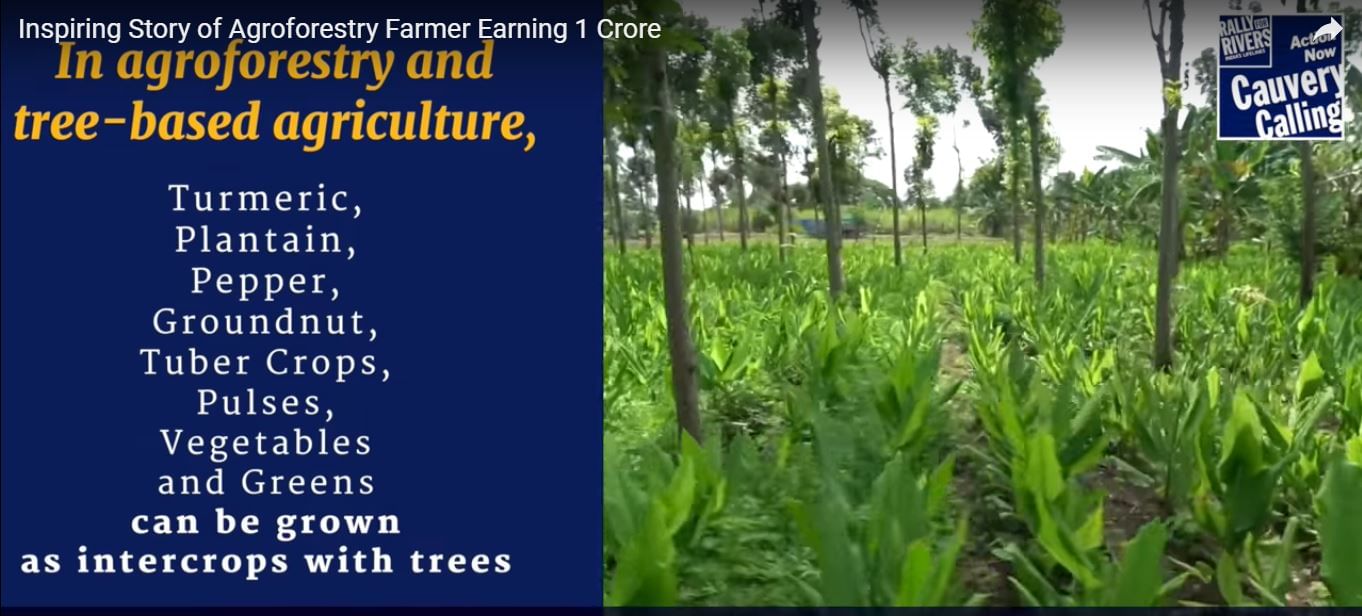
Along with this, Project GreenHands of Isha Foundation which is the recipient of the country’s highest environmental award, the Indira Gandhi Paryavaran Puraskar, has experience of agroforestry in Tamil Nadu for over 18 years.
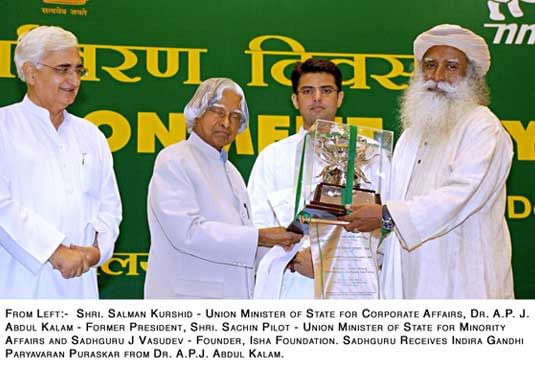
There are successful cases of agroforestry practiced by farmers in many districts of Tamil Nadu, including Cauvery basin districts.
It is wrong to surmise, as you have done, that Cauvery Calling is undertaken without any social action. The social outreach program that preceded the campaign involved volunteers visiting over 7000 villages and interacting with 2.7 lakh people in the Cauvery basin. Panchayat leaders have shown keen interest as Cauvery Calling addresses the crisis of water and agrarian distress that affects lakhs of farmers. Farmers and farmer association leaders expressed their support for the campaign.
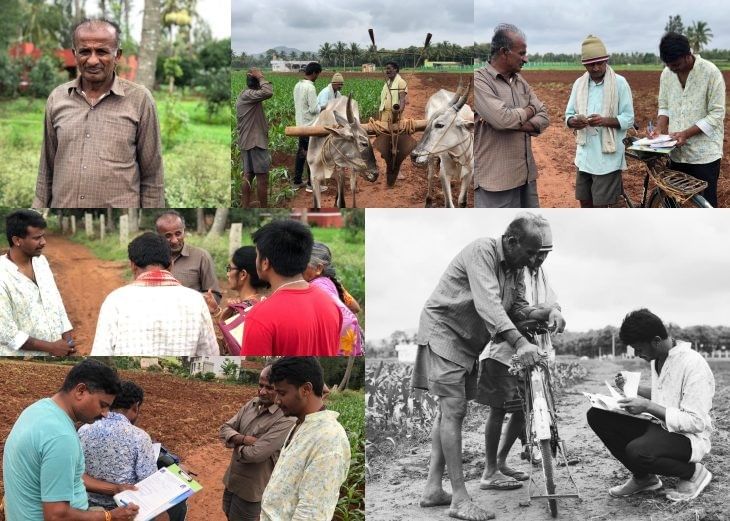
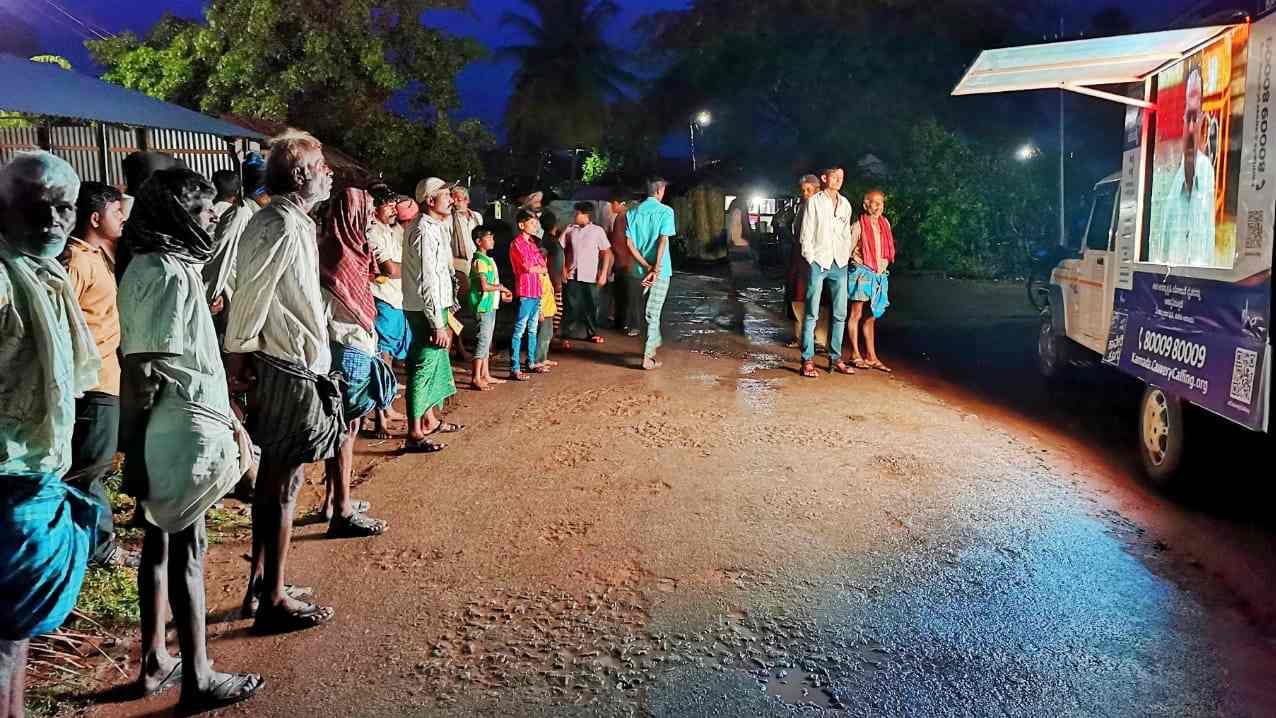
A defamatory campaign against Cauvery Calling, in fact, goes against the interest of livelihoods of farmers reviving India’s soil, water and food security of the nation. Since agroforestry takes the pressure off forests for timber, a successful program to grow trees outside forests actually helps to protect existing natural forests and their biodiversity. It does away with the need for production forestry and strengthens conservation forestry. It would be very unfortunate to have a totally wrong-headed `environment versus economy’ debate around Cauvery Calling, which is an economic program for farmers with a significant ecological impact.
As the program goes into the implementation phase, rest assured that we will work with Panchayat institutions. Karnataka and Tamil Nadu have a strong Panchayati Raj system. Both the State Governments have expressed their support for Cauvery Calling, and their support will be expressed through Panchayati Raj Institutions that have the functions, and functionaries devolved to them. Where Biodiversity Management Committees are active, we will seek their support since agroforestry improves local biodiversity. In forest-fringe villages where farmers are cultivating land they have received rights over under the Forest Rights Act, Forest Rights Committees will be our main institutions to work with.
Mr. DiCaprio has Not been wrongly advised about Cauvery Calling as you insinuate. We invite you to sit with us and learn about the work that has gone into this movement. We have proven this model on the ground over 18 years with 69,760 farmers in Tamil Nadu. Most of these farmers now have fully mature trees that have become high value assets which can be harnessed. Many of these farmers have also harvested these trees and have re-planted them seeing the increase in their income anywhere from 300% to 800% percent. We have never claimed that tree planting is the only way to save the river. We have chosen this activity, because trees are the most cost effective nature-based solution to the crisis of most Indian rivers including the one Cauvery is in right now. We have never campaigned that other rejuvenation activities mentioned are not needed. We have elaborately explained this in the Rally for Rivers Draft Policy Recommendation available to download on the rallyforrivers.org website. Anyone is free to choose in whatever way they want to contribute. We have chosen to work with farmers and plant trees, because that is our experience.
Allegation: The tree planting promoted by Isha Foundation, by inviting people to donate money to plant 2,420,000,000 trees, may appear incredibly attractive. But on deeper investigation it comes across as a method that promotes a monoculturist paradigm of landscape restoration which people of India have rejected long ago. Besides, such a programme could create unintended and unforeseen social and ecological consequences, as planting trees in certain regions (grasslands and floodplains for instance) could result in drying up of streams and rivulets, and destruction of wildlife habitats. Further, it can also lead to encroachments of the floodplains and riverbeds, as has happened at numerous places.
Response: This clearly shows you have not bothered to educate yourself on what our project is about. The agroforestry we are promoting is polyculture, not monoculture; multiple indigenous species of timber and horticulture species will be grown on a part of each farmer’s agricultural land which once had only annual crops. The growing of trees will thus increase both floral and faunal biodiversity. Cauvery Calling is not going to touch government or public land, including riparian lands, grasslands, and forest land. We are only asking farmers to partially convert their farmlands to agroforestry. These farmlands are in the river basin; two thirds of the land in the river basin is in farmers’ hands so there’s no way to increase green cover unless the farmers plant trees. We are well aware of the ecological consequences of planting trees where it should not be done. Please enlighten us on what “deeper investigation” you have done to come to your baseless conclusion about promoting a “monoculturist paradigm”. In the Detailed Project Report submitted to the government, the agroforestry models suggest intercropping along with agroforestry.
Allegation: Isha Foundation has very low credibility in conforming with Indian laws protecting human rights and the environment. No less an authority than the Comptroller and Auditor General of India, a constitutional body, has reported that the foundation has built its headquarters into an elephant corridor and on land belonging to Adivasis (original inhabitants of India, who are indigenous communities). It is also noted that Mr. Jaggi Vasudev and Isha Foundation have often resorted to populist and simplistic methods on various public concerns, and thus aiding denigration of systematic and serious efforts necessary to address complex environmental and social justice causes.
Response: These are blatant untruths and clearly propagated with malicious intent. Ministry of Environment, Forests and Climate Change, the Tamil Nadu State Forest Department have put this to rest long back having categorically stated that no elephant corridor ever existed on this land. Wildlife Trust of India report also clarifies the same. Nor has Isha grabbed land of Adivasis. This is a claim based on repetition of baseless allegations circulated in a journalistic piece that did not offer any evidence and which we have rebutted in the past. It’s incredible that an organization can make such brazen allegations without a shred of evidence and without bothering to learn the truth.
There has not been a single movement of this scale in the country that has been so successful in articulating complex environmental problems in very clear terms for the masses. If this makes us populist, so be it. This has been the success of the movement. The fact that the whole country has woken up to the crisis of our rivers, should be supported by groups who claim to work for the betterment of environment, rather than taking such ill-informed potshots. But because it has been a successful campaign that has been very effective in its communication, that does not make the solution any less technically rigorous.
Allegation: As a matter of fact, a Public Interest Litigation has already been filed in the Karnataka High Court against fund collection for ‘Cauvery Calling’. The link you have shared on your Facebook page of the Isha website reveals that the volume of money being gathered is over Rs 10,000 crores (US$1.5 billion). The implications of such massive funds being made available to a private foundation, particularly one that as a very weak, and rather dubious, record of compliance of human rights and environmental laws, is quite worrying.
Response: Yes, a frivolous PIL has been filed which is full of untruths, just like your letter. For instance, the Public Interest Litigation alleges, as you do, that Isha is collecting money to plant trees on public land without consulting the Government of Karnataka. On what basis are you stating that we have a “weak” and “dubious record of compliance of human rights and environmental laws”? We have already shown that allegations about building on an elephant corridor and grabbing Adivasi lands are baseless allegations without a shred of evidence.
Allegation: ‘Waterman of India’ Rajendra Singh has remarked that Jaggi Vasudev’s ‘Cauvery Calling’ is a campaign “just to earn name and money”.
Response: Everybody is entitled to their opinion, just as you are. You have challenged the opinion of Mr. DiCaprio because it does not match yours. You have overlooked the opinion of various experts who have publicly endorsed Cauvery Calling, as well as the eminent Board of Rally for Rivers which includes scientists, administrators, ecologists, jurists and people who have held public office. It is laughable to suggest that Sadhguru, a Padma Vibhusahan awardee would need to start a mega public campaign “to earn name and money.”
None of them felt that Cauvery Calling is meant to earn name and money. Democracy is not just about expressing one’s opinion. It is also about examining facts dispassionately and allowing oneself to be persuaded to modify one’s opinion. We are willing to look at any facts you would like to present, in place of the vague and unsubstantiated opinions in your open letter to Mr DiCaprio. We invite you to visit our work with farmers in Tamil Nadu, visit the Isha Yoga Centre, and present any evidence you have of violation of environmental laws and human rights.
In conclusion, we would like to state that anyone who genuinely cares for the environment, the river and the farmers of this country will make an effort to understand the Cauvery Calling campaign before running a malicious counter campaign with no observable intent. We invite you to engage with us in an unbiased dialogue so we can present to you what the Cauvery Calling movement is really about.
Editor's Note: For more details of clarification, email mediarelations@ishafoundation.org.




